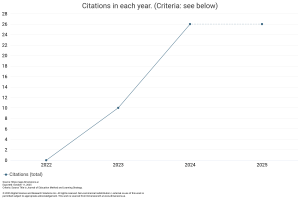Project-Based Learning in Elementary Social Studies: A Literature Review on Effectiveness and Learning Outcomes
DOI:
https://doi.org/10.59653/jemls.v3i03.1918Keywords:
Project-Based Learning (PjBL), Elementary Social Studies, Student Learning OutcomesAbstract
This article examines the impact of Project-Based Learning (PjBL) on elementary students’ learning outcomes in social studies through a literature review. The objective of this study is to identify how PjBL influences cognitive, affective, and psychomotor development, as well as creativity, motivation, collaboration, and communication skills. The method employed is a systematic analysis of 16 studies that investigate the implementation of PjBL in elementary classrooms. The findings indicate that PjBL enhances students’ understanding, retention, and application of material, promotes active engagement, and fosters 21st-century skills such as creativity and teamwork. The integration of interactive and visual learning media further strengthens learning effectiveness. However, challenges such as time constraints, large class sizes, and unequal group contributions may limit PjBL’s effectiveness if not properly addressed. Therefore, careful project planning, teacher guidance, and appropriate instructional media are essential to maximize PjBL’s benefits and support the holistic development of elementary students.
Downloads
References
Ansya, Y.A., Salsabila, T. (2023). HUBUNGAN PENGGUNAAN MODEL PROJECT BASED LEARNING TERHADAP Program Studi Pendidikan Guru Sekolah Dasar , Universitas Negeri Medan. Jurnal Handayani, December 2023. https://doi.org/10.24114/jh.v14i2.64472
Ardiansyah, R., Hastuti, D. N. A. E., & Sari, M. K. (2023). PEMBELAJARAN PJBL PADA MATERI IPAS KELAS IV SEKOLAH DASAR Rico. Didaktik : Jurnal Ilmiah PGSD FKIP Universitas Mandiri, 9(4), 360–365.
Azizah, W. A., Sarwi, S., & Ellianawati, E. (2020). Implementation of Project -Based Learning Model (PjBL) Using STREAM-Based Approach in Elementary Schools. Journal of Primary Education, 9(3). https://doi.org/10.15294/jpe.v9i3.39950
Cai, Z., Zhu, J., Yu, Y., & Tian, S. (2023). Elementary school teachers’ attitudes towards project-based learning in China. Humanities and Social Sciences Communications, 10(1). https://doi.org/10.1057/s41599-023-02206-8
Carvalho, A. R., & Santos, C. (2021). The transformative role of peer learning projects in 21st century schools—achievements from five Portuguese educational institutions. Education Sciences, 11(5). https://doi.org/10.3390/educsci11050196
Dari, P. W., Hermansyah, H., & Selegi, S. F. (2021). Efektivitas Model Pembelajaran Project Based Learning Terhadap Hasil Belajar IPS Kelas IV. Innovative: Journal Of Social Science Research, 2(1), 79–87. https://doi.org/10.31004/innovative.v2i1.2845
Kjällander, S., Mannila, L., Åkerfeldt, A., & Heintz, F. (2021). Elementary students’ first approach to computational thinking and programming. Education Sciences, 11(2). https://doi.org/10.3390/educsci11020080
LeTendre, G. K., & Gray, R. (2024). Social robots in a project-based learning environment: Adolescent understanding of robot–human interactions. Journal of Computer Assisted Learning, 40(1). https://doi.org/10.1111/jcal.12872
Made Bagiada, Nyoman Dantes, & Sariyasa. (2024). Implementasi Model Project Based Learning: Dampaknya terhadap Sikap Nasionalisme dan Prestasi Belajar IPS. Jurnal Ilmiah Pendidikan Profesi Guru, 7(1), 1–13. https://doi.org/10.23887/jippg.v7i1.75166
Nata, I. G. H., & Sujana, I. W. (2021). Efektivitas Model Project Based Learning Berbasis Tri Kaya Parisudha dalam Meningkatkan Kompetensi Pengetahuan IPS. Thinking Skills and Creativity Journal, 3(2), 91–98. https://doi.org/10.23887/tscj.v3i2.32219
Nikmatul, N. F., Fenny Roshayanti, & Fine Reffiane. (2023). Pengaruh Model Pembelajaran Project Based Learning Pada Mata Pelajaran Ips Terhadap Hasil Belajar Peserta Didik Kelas V Sd N Peterongan Semarang. In Didaktik : Jurnal Ilmiah PGSD STKIP Subang (Vol. 9, Issue 2, pp. 4412–4421). https://doi.org/10.36989/didaktik.v9i2.1113
Penulis, I., Saputra, E. E., Suziman, A., & Artikel, I. (2025). Integrasi Pendekatan Teori Belajar Konstruktivisme Melalui Model Project-Based Learning pada Pembelajaran Ips di Sekolah Dasar. In Sulawesi Tenggara Educational Journal (Vol. 5, Issue 1, pp. 469–475).
Prabaningrat, F. H., Susiani, T. S., & Wahyudi, W. (2023). Penerapan Model Pembelajaran Project Based Learning (PjBL) dengan Media Konkret untuk Meningkatkan Pembelajaran IPS tentang Peristiwa Kebangsaan Masa Penjajahan. Kalam Cendekia: Jurnal Ilmiah Kependidikan, 11(3). https://doi.org/10.20961/jkc.v11i3.74550
Rahmawati, N., Simbolon, M. E., & Nugraha, F. F. (2022). PENGARUH MODEL PEMBELAJARAN PROJECT BASED LEARNING (PJBL) TERHADAP KREATIVITAS SISWA. Jurnal Ilmiah Aquinas, 2(3), 162–167. https://doi.org/10.51878/elementary.v2i3.1383
Retnowati, E., Nugraheni, N., Azizah, L. N., Semarang, U. N., Negeri, S. D., & Ngisor, B. (2023). Penerapan Model PJBL Berbantuan Lapbook Untuk Meningkatkan Hasil Belajar IPS Kelas IV SDN Bendan Ngisor. Jurnal Ilmiah Multidisipline, 1(6), 613–619.
Revelle, K. Z. (2019). Teacher perceptions of a project-based approach to social studies and literacy instruction. Teaching and Teacher Education, 84. https://doi.org/10.1016/j.tate.2019.04.016
Witarsa, & Muhammad, S. (2023). Critical thinking as a necessity for social science students capacity development: How it can be strengthened through project based learning at university. Frontiers in Education, 7. https://doi.org/10.3389/feduc.2022.983292
Wong, S. S. H., Kim, M., & Jin, Q. (2021). Critical Literacy Practices Within Problem-Based Learning Projects in Science. Interchange, 52(4). https://doi.org/10.1007/s10780-021-09426-4
Wulanda, F. H., Widiyono, A., & Muzakki, M. A. (2025). Pengaruh Model PjBL Berbasis Media Kartu Sifat Benda terhadap Hasil Belajar IPAS di SD. JagoMIPA: Jurnal Pendidikan Matematika Dan IPA, 5(1), 239–248. https://doi.org/10.53299/jagomipa.v5i1.1339
Downloads
Published
How to Cite
Issue
Section
License
Copyright (c) 2025 Imron Burhan, Musfirah, Nur Fadny Yuliani, Siswati Rachman, Amriadi

This work is licensed under a Creative Commons Attribution-ShareAlike 4.0 International License.
Authors who publish with this journal agree to the following terms:
- Authors retain copyright and grant the journal right of first publication with the work simultaneously licensed under a Creative Commons Attribution-ShareAlike that allows others to share the work with an acknowledgement of the work's authorship and initial publication in this journal.
- Authors are able to enter into separate, additional contractual arrangements for the non-exclusive distribution of the journal's published version of the work (e.g., post it to an institutional repository or publish it in a book), with an acknowledgement of its initial publication in this journal.
- Authors are permitted and encouraged to post their work online (e.g., in institutional repositories or on their website) prior to and during the submission process, as it can lead to productive exchanges, as well as earlier and greater citation of published work (See The Effect of Open Access).
























